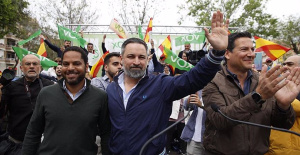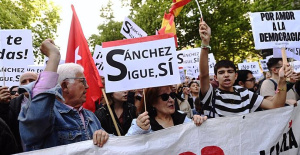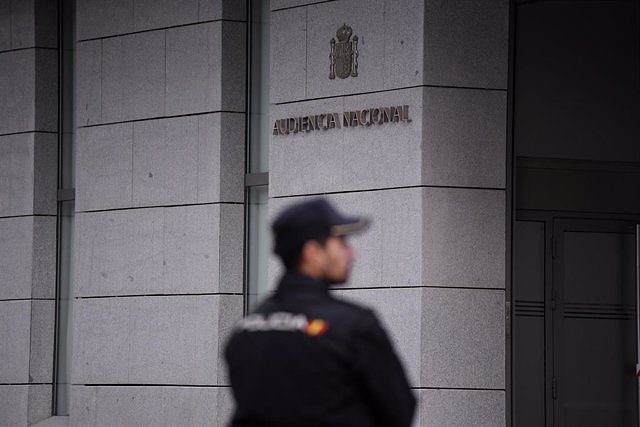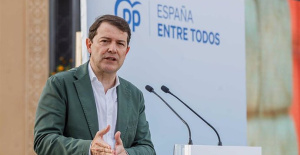They planned to occupy the Parliament, entrench themselves for a week and "defend it later"
The Prosecutor's Office of the National Court has asked to impose sentences of between 8 and 27 years in prison on 12 members of the Committees for the Defense of the Republic (CDR) for a crime of belonging to a terrorist organization, also accusing eight of them of possession crimes. , deposit and manufacture of explosives and damage, in a case that will be affected by the amnesty.
In his indictment, collected by Europa Press, prosecutor Miguel Ángel Carballo maintains that the accused joined a Tactical Response Team (ERT), a group of people from different CDRs who would have formed a parallel, clandestine terrorist organization. and stable, whose objective would be to carry out violent actions or attacks with explosives and incendiary substances.
Specifically, the prosecutor asks to sentence Eduardo Garzón, Esther García, Sonia Pascual, Queralt Casoliva, Germinal Tomás, Alexis Codina, Jordi Ros and Rafael Delgado to 27 years in prison for crimes of belonging to a terrorist organization; possession, storage or manufacture of explosives; and havoc, the latter in an attempted degree. For them, the Public Ministry also requests a measure of supervised release for eight years.
Regarding the other defendants, the Prosecutor's Office requests 8 years in prison for Ferrán Jolis, Xavier Buigas, David Budria and Clara Borrero solely for the crime of belonging to a terrorist organization.
For all the accused, the Prosecutor's Office requests legal accessories and also sentences of absolute disqualification, special disqualification for educational profession or trade, in the areas of teaching, sports and free time, for a period of time greater than ten years than the duration of the sentence. of deprivation of liberty imposed.
It is worth remembering that the amnesty law explains that only "acts classified as terrorist crimes punishable in Chapter VII of Title XXII of the Penal Code are excluded from it as long as a final sentence has been handed down", so the 12 CDR could take advantage of it.
In his writing, the prosecutor relates that "as a consequence of the illegal self-determination referendum of October 1, 2017 (1-O), within Catalan society, with independence aspirations, expectations were generated in relation to the achievement of the secession of Catalonia from the Spanish State and the constitution of a Catalan republic."
"The classic pro-independence organizations were joined by a new actor who called himself the CDR. The CDR's activity contributed great dynamism to the street mobilization, being key to the planning and execution of simple actions (graffiti) and complex actions (general strikes, country courts, etc.)", he details.
After 1-O, "after the days had passed and, after observing that the people's mandate was not implemented", consisting of "constituting Catalonia in a republic independent of the Spanish State, the CDR, which brought together the most dynamic and active independence militants , organized numerous acts and actions of a very diverse nature throughout the Catalan geography, some of the CDR's actions reaching criminal character, there being abundant criminal proceedings against CDR militants who had participated in illegal actions and activities.
The prosecutor continues by pointing out that, "although initially the reason for the creation of the CDR was to ensure the holding of the referendum, in reality said groups or structures were conceived with a purpose that intended an existence beyond the aforementioned date, which meant adoption of the original idea of Poble Lliure".
"In this way, we are faced with groups composed of a plurality of people whose objective is to subvert the constitutional order in a material way, through a planned and organized strategy. This intention is manifested through the refusal to follow the channels legally established by the Rule of Law for political and social demands," he says.
THE SPIN-OFF OF THE GROUP
The ERT, specifically, "is a cell made up of the accused, a small group of individuals from different CDRs who show great radicalism." "The creation of this cell is motivated by the need to have, within the structure of the CDR, a clandestine group of individuals of the utmost trust and who are totally dedicated to the cause," he says.
The prosecutor maintains that the accused "share radical activism to achieve independence", and "their ultimate objective as an organization was to achieve the independence of Catalonia, using violence in its maximum expression, thereby coercively forcing the institutions to grant through deeds the separation of Catalonia from the rest of Spain."
Along these lines, he points out that the members of the ERT "have had an active participation in the materialization of some of the most forceful actions that the CDR have carried out to date", such as "road blocks or the pouring of oil on the road of the C-55 in a place of mandatory passage for the procession that transported the prisoners from the Lledoners Penitentiary Center", as well as the "raising of the toll barriers".
THE ASSAULT ON THE PARLIAMENT
Furthermore, the "accused participated in the creation and development of the CECOR (coordination center) for the actions of the CDR, assuming the assignment received from a so-called Catalan CNI to provide the necessary logistical infrastructure in order to undertake an action in which was intended to occupy the Parliament of Catalonia, and subsequently defend it, all given the technical and human capacity of the aforementioned group, because to carry out the same, significant knowledge of illicit and clandestine secured telecommunications networks would be necessary, as well as a important mobilization capacity".
"As accredited details of the aforementioned plan, the occupation would be carried out through the main door of the Parliament since, supposedly, access would be facilitated from the inside. Together with a small group of people, they would cooperate with the group called CNI, and they would be in charge "the rental of properties and premises that would provide them with security and the establishment of administration bases, to remain inside the building for at least a week, setting up long-distance antennas to maintain communications, all of this under a budget estimated at 6,000 euros." , Add.
The Prosecutor's Office makes it clear that "the accused formed a hierarchical structure, with distribution of roles and specializations, equipped with the appropriate means and a desire to permanence to commit criminal acts such as those described, taking advantage of the contacts fostered within the militancy in the CDR, constituted a cell that raised the intensity and nature of the actions carried out to a higher level.
Thus, and as members of the ERT, all of them "would have surpassed the activity within the respective CDR and formed a parallel terrorist organization, of a clandestine and stable nature, whose objective would be to carry out violent actions or attacks against previously selected targets using "the explosives and/or incendiary substances manufactured in the two clandestine laboratories that the organization itself had installed in two private homes".

 Exploring Cardano: Inner Workings and Advantages of this Cryptocurrency
Exploring Cardano: Inner Workings and Advantages of this Cryptocurrency Seville.- Economy.- Innova.- STSA inaugurates its new painting and sealing hangar in San Pablo, for 18 million
Seville.- Economy.- Innova.- STSA inaugurates its new painting and sealing hangar in San Pablo, for 18 million Innova.- More than 300 volunteers join the Andalucía Compromiso Digital network in one month to facilitate access to ICT
Innova.- More than 300 volunteers join the Andalucía Compromiso Digital network in one month to facilitate access to ICT Innova.-AMP.- Ayesa acquires 51% of Sadiel, which will create new technological engineering products and expand markets
Innova.-AMP.- Ayesa acquires 51% of Sadiel, which will create new technological engineering products and expand markets Abascal (Vox) criticizes that Sánchez is "victimizing" himself and calls for elections after his possible resignation
Abascal (Vox) criticizes that Sánchez is "victimizing" himself and calls for elections after his possible resignation Carlos Alcaraz reaches the round of 16 in Madrid without breaking a sweat
Carlos Alcaraz reaches the round of 16 in Madrid without breaking a sweat Some 5,000 people demonstrate in front of Congress for democracy, hours before Sánchez's decision
Some 5,000 people demonstrate in front of Congress for democracy, hours before Sánchez's decision STATEMENT: Intelligent systems used in the construction of the deepest underwater tunnel in China
STATEMENT: Intelligent systems used in the construction of the deepest underwater tunnel in China How Blockchain in being used to shape the future
How Blockchain in being used to shape the future Not just BTC and ETH: Here Are Some More Interesting Coins Worth Focusing on
Not just BTC and ETH: Here Are Some More Interesting Coins Worth Focusing on UPV students build a prototype of a wooden house to move to Equatorial Guinea
UPV students build a prototype of a wooden house to move to Equatorial Guinea The UA opens the call for the Impulso 2024 Awards for the best innovative business initiatives
The UA opens the call for the Impulso 2024 Awards for the best innovative business initiatives ALI, virtual assistant from Alicante, internationally recognized by the OECD
ALI, virtual assistant from Alicante, internationally recognized by the OECD Retrópolis brings the golden age of video games and computing to the UPV
Retrópolis brings the golden age of video games and computing to the UPV A million people demonstrate in France against Macron's pension reform
A million people demonstrate in France against Macron's pension reform Russia launches several missiles against "critical infrastructure" in the city of Zaporizhia
Russia launches several missiles against "critical infrastructure" in the city of Zaporizhia A "procession" remembers the dead of the Calabria shipwreck as bodies continue to wash up on the shore
A "procession" remembers the dead of the Calabria shipwreck as bodies continue to wash up on the shore Prison sentences handed down for three prominent Hong Kong pro-democracy activists
Prison sentences handed down for three prominent Hong Kong pro-democracy activists ETH continues to leave trading platforms, Ethereum balance on exchanges lowest in 3 years
ETH continues to leave trading platforms, Ethereum balance on exchanges lowest in 3 years Investors invest $450 million in Consensys, Ethereum incubator now valued at $7 billion
Investors invest $450 million in Consensys, Ethereum incubator now valued at $7 billion Alchemy Integrates Ethereum L2 Product Starknet to Enhance Web3 Scalability at a Price 100x Lower Than L1 Fees
Alchemy Integrates Ethereum L2 Product Starknet to Enhance Web3 Scalability at a Price 100x Lower Than L1 Fees Mining Report: Bitcoin's Electricity Consumption Declines by 25% in Q1 2022
Mining Report: Bitcoin's Electricity Consumption Declines by 25% in Q1 2022 Oil-to-Bitcoin Mining Firm Crusoe Energy Systems Raised $505 Million
Oil-to-Bitcoin Mining Firm Crusoe Energy Systems Raised $505 Million Microbt reveals the latest Bitcoin mining rigs -- Machines produce up to 126 TH/s with custom 5nm chip design
Microbt reveals the latest Bitcoin mining rigs -- Machines produce up to 126 TH/s with custom 5nm chip design Bitcoin's Mining Difficulty Hits a Lifetime High, With More Than 90% of BTC Supply Issued
Bitcoin's Mining Difficulty Hits a Lifetime High, With More Than 90% of BTC Supply Issued The Biggest Movers are Near, EOS, and RUNE during Friday's Selloff
The Biggest Movers are Near, EOS, and RUNE during Friday's Selloff Global Markets Spooked by a Hawkish Fed and Covid, Stocks and Crypto Gain After Musk Buys Twitter
Global Markets Spooked by a Hawkish Fed and Covid, Stocks and Crypto Gain After Musk Buys Twitter Bitso to offset carbon emissions from the Trading Platform's ERC20, ETH, and BTC Transactions
Bitso to offset carbon emissions from the Trading Platform's ERC20, ETH, and BTC Transactions Draftkings Announces 2022 College Hoops NFT Selection for March Madness
Draftkings Announces 2022 College Hoops NFT Selection for March Madness























